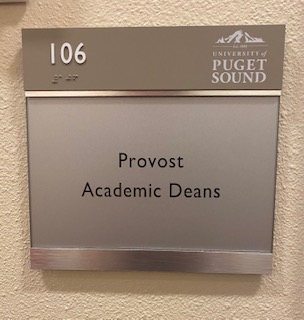
By Emma Loenicker
In July 2022, President Isiaah Crawford announced Laura Behling’s resignation from the Provost position. Appointed in 2019 by President Crawford, Professor Behling worked for three years to advance the University’s future, drawing from pre-existing values developed throughout the University’s history.
In this same address, President Crawford announced that Nick Kontogeorgopoulos, former Associate Dean, would take over as interim provost while the University conducts a national search for a new provost.
Behling served our campus community through trying times such as during the COVID-19 pandemic, which impacted higher education institutions in many profound ways including a national decline in average student enrollment rates and an international decline in financial stability. During those challenging years, Behling and other leadership figures at the University collaborated to devise new strategies and academic initiatives for University’s enrichment and engagement.
In fall of 2022, a student success task force convened to conceive strategies that would improve retention rates. Although that task force is no longer standing, the recommendations they proposed were presented to the cabinet and have been in the process of implementation ever since.
Julie Christoph, Dean of Faculty Affairs and Professor of English; Sunil Kukreja, Dean of Graduate Students and Professor of Sociology & Anthropology and Asian studies; and Nick Kontogeorgopoulos, Interim Provost, and Professor of IPE, Asian studies, and Global Development studies, all of whom are leaders of the University’s academic affairs division, understand these initiatives to be a source of ongoing change. Kontogeorgopoulos explained that “the priorities of the institution don’t change with individuals in positions,” making it clear that regardless of transitions in leadership, the University’s direction will always be bound and guided by the “mission of the University and the strategic plan.”
In times like the pandemic, when the ability to inspire change is hindered, Christoph believes that “we have always been an institution that tries to make the most of what we have,” and she thinks that process has been “a labor of love.” Coming out of a series of difficult years, there are plenty of opportunities for growth and improvement in our campus community, as well as new challenges to face.
According to Kukreja, the ongoing initiatives pursued by this University are “deeply committed to the focus on diversity, equity, and inclusion.” Some of these initiatives include promoting integration and the sense of belonging to the larger community, enhancing summer programs, internationalization of our campus and experiential learning.
Starting with the class of 2026, students will be “committing to doing one or four activities: study abroad, summer research, internship, or community-based learning” in their time here, said Kontogeorgopoulos. Referring to the experiential learning program that Kontogeorgopoulos launched, Kukreja thinks the change “speaks volumes about the way in which we have pivoted.”
Christoph shed important light on the way that curriculum also plays a significant role in university enrichment. It is an evolving chronicle that undergoes change and improvement as “disciplines progress, and student needs change.” While methods of change are evolving, Christoph explained that the significance the University places on improvement is not a new development.
Going forward, Kontogeorgopoulos, as the interim provost, will expand his responsibilities and approach his position by “trying to figure out the history of certain issues and how to proceed from there.” Christoph, Kukreja, and Kontogeorgopoulos all expressed certainty that the future provost, whoever that might be, will advance the priorities established by leaders of the University both in the present and in the past.
